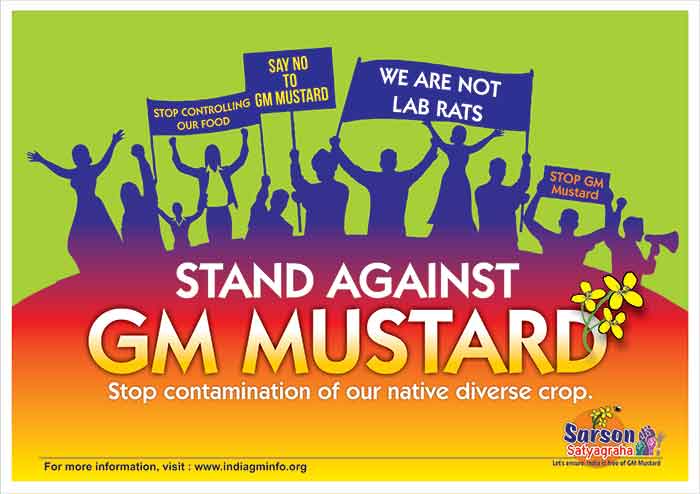
In the on-going case on GM Mustard in the Supreme Court of India the bench has taken the very appropriate stand that the court cannot get involved beyond a point in research complexities but it will see to it that the national interests are protected. One of the best ways of doing this is to see carefully what the evidence so far is regarding the GM crops. The Court cannot turn into a research scientist, but it can look at what the most senior scientists known also for their commitment to the public interest have been saying. Surely the opinion of such scientists should get more impotence than the opinion of those who have been working with multinational corporations known to be very exploitative towards farmers and known also for their attempts of trying to dominate the farm and food systems of developing countries. If according to reviews by very reputed scientists it can be shown that GM crops have been a disaster, then this view should get adequate importance.
As the court debate has also gone into issues of increasing edible oil production and supply, it is also important to look at how the domestic shortage of edible oils was caused and what is the best way of increasing this. This will clearly show that it is by correcting serious policy distortions, which have been very unjust to traditional oilseed farmers, that the domestic edible oil production can increase, while relying falsely on GM crops for this is likely to accentuate problems instead of solving them.
Here we may note that GM crops and the herbicides accompanying them have been in court cases in other countries too and generally courts have been sympathetic to the victims of these crops and the agro-chemicals accompanying them. A case which attracted worldwide attention relates to the award of huge compensation to Johnson, a school groundskeeper, by a California jury on account of his health being damaged severely by a herbicide glyphosate which this groundskeeper had to use regularly, resulting in very painful and life-threatening blood-cell cancer. There was widespread sympathy for this victim and Edward Kennedy (he is now a Presidential candidate) was among the team of lawyers who argued this case.
For people involved in food safety issues this case had an additional significance. The herbicide in question is produced most prominently by a multinational company which is also in the forefront of the spread of GM crops. It has been involved in providing packages in which the company’s GM seeds are closely tied to the marketing of the disputed herbicide whose serious health hazards had been the subject of much debate earlier also. In the course of the hearings of this case, however, it became increasingly clear that the so-called scientific evidence of safety of its products by which the giant multinational company had been swearing had many holes in it and at times its own findings were being passed off as the opinion of reputed scientists.
As the issues of food safety and health hazards are so important and as this and a few other multinational companies appear to be so determined to gain increasing domination of the world food and farming markets by relentless lobbying for GM crops and agro-chemicals tied to these crops, it is important to look carefully at the scientific evidence available on this subject. All the time some of the most eminent scientists have been warning against GM crops but at the same time these powerful companies along with their influential collaborators in the government and the media have been claiming that the scientific evidence is on their side. So the common people are sometimes confused regarding whom to believe. This confusion can be cleared by looking at what the most eminent scientist of India on this subject said shortly before his death. This scientist was the most well-informed scientist in India on this subject. Our reference here is of course to Dr. Pushpa Bhargava.
Dr. Pushpa M. Bhargava was the founder of the Centre for Cellular and Molecular Biology and in addition he was also the Vice Chairperson of the National Knowledge Commission. Many people’s science movements looked upon him as their mentor. He had been appointed by the Supreme Court of India as an observer in the Genetic Engineering Appraisal Committee as he was widely perceived to be not only a very accomplished expert on this issue and that too of the highest integrity but in addition he was also seen on the basis of his past record as a very strong and persistent defender of public interest.
Therefore it is very useful and interesting to see what this very senior scientist with a comprehensive understanding of this issue had to say about GM crops. First of all he made a strong and clear effort to break the myth which had been created by relentless manipulation by the very powerful forces trying to spread GM crops In India. According to this myth most scientific research supports GM crops. While demolishing this myth Dr. Bhargava wrote, “ There are over 500 research publications by scientists of indisputable integrity , who have no conflict of interest, that establish harmful effects of GM crops on human, animal and plant health, and on the environment and biodiversity. For example, a recent paper by Indian scientists showed that the Bt gene in both cotton and brinjal leads to inhibition of growth and development of the plant. On the other hand, virtually every paper supporting GM crops is by scientists who have a declared conflict of interest or whose credibility and integrity can be doubted.”
In another review of recent trends titled ‘Food Without Choice’ (published in the Tribune ) Prof. Pushpa M. Bhargava , who was an internationally acclaimed authority on this subject, drew pointed attention to the ” attempt by a small but powerful minority to propagate genetically modified crops to serve their interests and those of multinational corporations (read the US), the bureaucracy, the political setup and a few unprincipled and unethical scientists and technologists who can be used as tools.” Further he warned, “The ultimate goal of this attempt in India of which the leader is Monsanto, is to obtain control over Indian agriculture and thus food production. With 60 per cent of our population engaged in agriculture and living in villages, this would essentially mean not only a control over our food security but also over our farmer security, agricultural security and security of the rural sector.”
The strong stand of Dr. Bhargava against GM crops is supported by other eminent scientists in various parts of world. A group of eminent scientists organized under the Independent Science Panel have stated in very clear terms, “GM crops have failed to deliver the promised benefits and are posing escalating problems on the farm. Transgenic contamination is now widely acknowledged to be unavoidable, and hence there can be no co-existence of GM and non-GM agriculture. Most important of all, GM crops have not been proven safe. On the contrary, sufficient evidence has emerged to raise serious safety concerns, that if ignored could result in irreversible damage to health and the environment. GM crops should be firmly rejected now.“
The Independent Science Panel (ISP) is a panel of scientists from many disciplines and countries, committed to the promotion of science for the public good. In a document titled ‘The case for a GMO-free Sustainable World’ the ISP has stated further, “By far the most insidious dangers of genetic engineering are inherent to the process itself, which greatly enhances the scope and probability of horizontal gene transfer and recombination, the main route to creating viruses and bacteria that cause disease epidemics. This was highlighted, in 2001, by the ‘accidental’ creation of a killer mouse virus in the course of an apparently innocent genetic engineering experiment. Newer techniques, such as DNA shuffling, are allowing geneticists to create in a matter of minutes in the laboratory millions of recombinant viruses that have never existed in billions of years of evolution. Disease-causing viruses and bacteria and their genetic material are the predominant materials and tools for genetic engineering, as much as for the intentional creation of bio-weapons.”
Several scientists involved in studying the implications and impacts of genetic engineering got together at the International Conference on ‘Redefining of Life Sciences’ organized at Penang, Malaysia, by the Third World Network. They issued a statement (the Penang Statement, or PS) which questioned the scientific basis of genetic engineering. This statement said :
“The new biotechnology based upon genetic engineering makes the assumption that each specific feature of an organism is encoded in one or a few specific, stable genes, so that the transfer of these genes results in the transfer of a discrete feature. This extreme form of genetic reductionism has already been rejected by the majority of biologists and many other members of the intellectual community because it fails to take into account the complex interactions between genes and their cellular, extracellular and external environments that are involved in the development of all traits.
“It has thus been impossible to predict the consequences of transferring a gene from one type of organism to another in a significant number of cases. The limited ability to transfer identifiable molecular characteristics between organisms through genetic engineering does not constitute the demonstration of any comprehensive or reliable system for predicting all the significant effects of transposing genes.”
Hence it is clear that to promote GM crops as a means of increasing crop productivity has no basis in scientific reality and is merely a manipulation tactic of the powerful GM lobby which uses highly selective data to somehow promote its case in the wake of ever-increasing evidence against GM crops. The powerful GM lobby uses many kinds of front-men but behind the scenes it is essentially controlled by the most powerful, resourceful and biggest multinational companies in the food, farming, agro-chemical and related sectors.
The edible sector and oilseeds sector is being guided more and more by big business interests, foreign interests and multinational company interests. At one point India was on the verge of achieving self-reliance in edible oils but this was disrupted due to reduced import duties and tariffs, resulting in the Indian market getting flooded by imported edible oil , harming and discouraging our oilseed farmers.
India has a very rich heritage of traditional oilseeds such as mustard, sesame, groundnut, coconut and a host of other crops. A rich diversity of traditional varieties known for their good yields, taste, suitability to local conditions are available , these are well-suited to local crop rotations and farmers have well-developed skills for growing these varieties. Ignoring this traditional wealth, the government policy under the influence of big business interests has opted for spreading palm oil and GM mustard varieties and both of these will prove highly disruptive for agro-ecology, according to all available evidence on palm oil as well as on GM crops. It is time today to stop big-business oriented disruption of our heritage and our environment and to opt for those available solutions which protect our farmers and protect our heritage and our environment.
In the course of recent hearings, the Supreme Court also expressed concern over the increasing dependence on chemical fertilizers. This dependence as well as dependence on highly dangerous herbicides and pesticides will only increase by opting for GM crops and all big business oriented farming systems as many multinational companies control seeds as well as agro-chemicals and try to spread those seeds and varieties which use more and more expensive agro-chemicals, thereby aggravating farmers’ crisis and also harming soil and environment.
Bharat Dogra is Honorary Convener, Campaign to Save Earth Now. His recent books include India’s Quest for Sustainable Farming and Healthy Food, Protecting Earth for Children, Man over Machine (Gandhian Ideas for Our Times) and When the Two Streams Met ( Freedom movement of india).















































